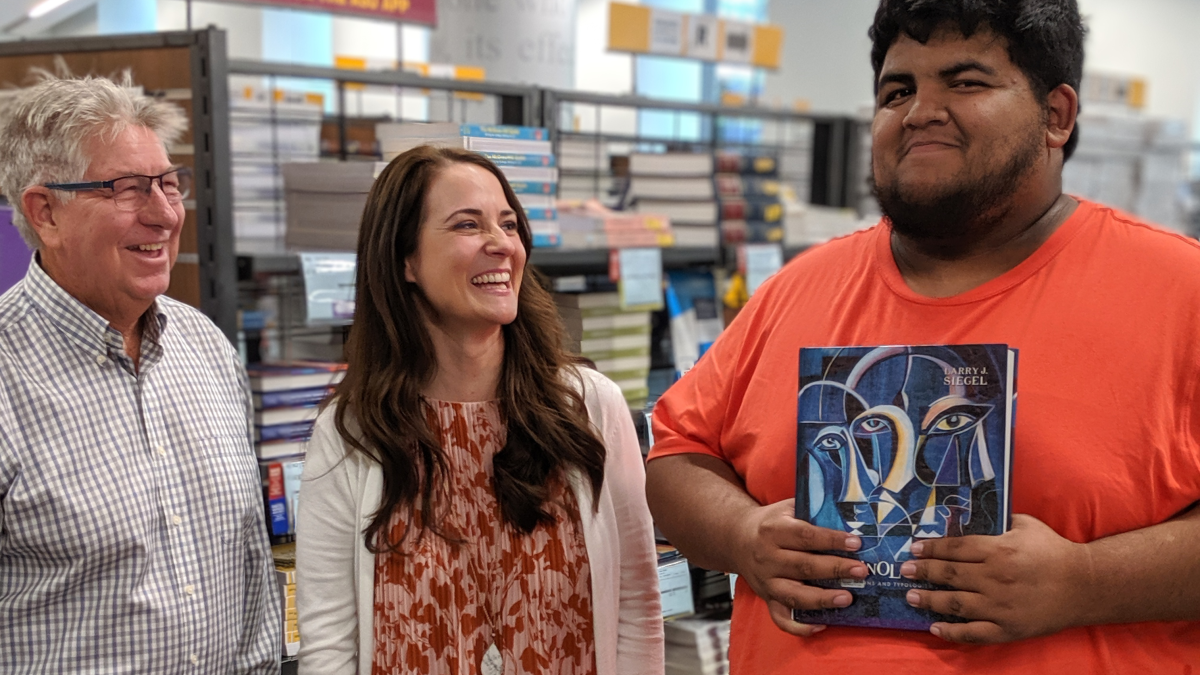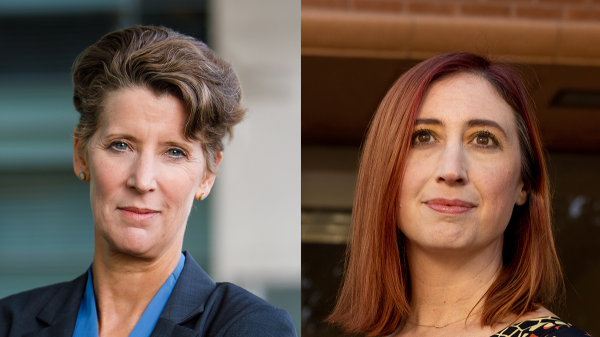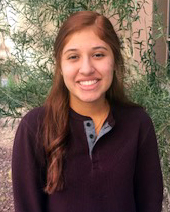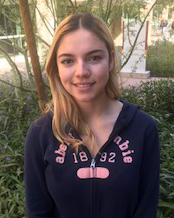Follett donation to ASU Bridging Success helps students exiting foster care pay for books

Bridging Success student and criminology and criminal justice minor Allan Valles Sanchez (right) shops for textbooks with Val Ross, area director of Sun Devil Campus Stores, and Ashlie Singleton, Follett regional manager of sales and operations.
Learning they’re eligible for a college tuition waiver would usually be enough to send any 18-year-old to the moon and back.
That’s how youth in foster care in Arizona likely feel after being told they’re potentially eligible for a tuition waiver at any of Arizona’s three state universities or any community college, courtesy of recent state legislation. After dealing with the difficulties many of these youth have faced, receiving a tuition waiver might be like winning a new car on a TV game show.
However, similar to winning a shiny new vehicle, a tuition waiver doesn’t cover incidental expenses that can be cost prohibitive. The reality is, although the tuition waiver removes one of the major barriers to getting a college degree, many students still must pay for books, supplies, academic fees and room and board on their own through additional scholarships, grants, work-study programs and other forms of financial aid.
Upon reaching adulthood, many of these young people are starting college with limited or no family, social and financial support available to help them through their academic journey at ASU. Because of this, these early steps into higher education can be extremely scary as they face yet another unfamiliar set of circumstances.
ASU Bridging Success, based at the Watts College of Public Service and Community Solutions, is a program that aims to stand in the gap for students coming to the university from the foster care system, said program coordinator Justine Cheung.
“We are here with a holistic, trauma-informed program that understands the child welfare system, the implications of what being in care means, the strengths our students bring with them and challenges they may face as they pursue their degree,” Cheung said.
“Over the years of running this program, one of the biggest concerns I hear from our students is how they will pay for their books,” Cheung explained. “But this year their concerns were addressed through a generous donation made by Follett Corporation to ASU Bridging Success.”
In early fall, Val Ross, area director of Sun Devil Campus Stores, and Ashley Singleton, regional manager of Follett Higher Education Group, met with Cheung to learn about the work Bridging Success does and the students they serve. The result of the meeting was a $25,000 grant to help students in the Bridging Success program cover book expenses.
Students with foster care backgrounds who participated in Bridging Success Early Start, a partnership program administered by ASU University College that provides a six-day college transition experience for incoming first-year and transfer students, also received an additional $50 bookstore gift card. These funds make a significant impact toward offsetting the cost of books and supplies.
Samantha Sahagun
Financial concerns meant nerve-wracking days leading up to Samantha Sahagun’s first day of fall classes. A Barack Obama Scholar, she knew that program would cover her meals. But books and other costs were another matter.
“One thing I was scared about was purchasing my books,” the freshman social work major from Phoenix said. “But when we received the grant to get our books for the first semester, I started crying.”
For freshman Carina Jaramillo, students in her group already had an idea they were going to receive “a little help” to buy books, but learning about the grant and the gift cards transformed the experience.
“Books were expensive, and it was great just to know it was going to be off my plate, that they would provide it,” said Jaramillo, a medical studies major from Douglas, Arizona. “Many of us didn’t know how we were able to buy books.”
“It’s been pretty good so far,” Jaramillo said. “The scholarship from the bookstore really helped. Financial aid really helped me. Everything just fell into place after that.”
The two said Bridging Success continues to help them meet the challenges of college. For one thing, it enabled them to recognize there are many others like themselves.
“There are a lot more people who come from my background,” Jaramillo said. “My roommate has a lot in common with me.”
For Sahagun, Bridging Success is another vital support system.
“It’s there for when I need someone to talk to,” she said. “Two weeks before school, they showed us around MyASU (a platform on the ASU website), how scholarships work. They’re like my cheerleaders; they want me to succeed. They are definitely a major part of my education at ASU because I know they’ll be there if I fall.”
Carina Jaramillo
Jaramillo agreed.
“Coming into Bridging Success, I didn’t know what it was. But it helped me prepare for college. There were a lot of workshops to help me learn what college was going to be like. They are like a second family, basically,” she said. “We have an emergency fund, for example — it doesn’t have to be school-related, like if your car broke down — and for emotional support, too. They would be the hand that you need in case of hard times.”
Sahagun said that after “everything was handed to you in high school,” Bridging Success helped her learn how to be independent and responsible with her academic obligations.
“Anything you do is on you now. It’s not, like, who’s taking care of you. I feel I have to be more responsible. Being responsible isn’t as scary for me now because I know who to ask.”
Jaramillo said her advice to those coming out of foster care and seeking to enter ASU is to not be afraid to come out of their comfort zones.
“Don’t be afraid to tell people where you come from,” she said. “At ASU, it’s a new beginning, a new fresh start.”
Make a contribution to the Bridging Success Emergency Fund.
Written by Mark Scarp
More University news

2 ASU faculty members elected to prestigious National Academy of Medicine
Two distinguished Arizona State University faculty members have been elected to the National Academy of Medicine.Sally C.…

ASU establishes Center for Free Speech, will host annual free speech forum
Arizona State University is establishing a new Center for Free Speech to encourage the uninhibited exchange of ideas, and the…

Public affairs professor, back at ASU after 3 years with NSF, is named Sackton Chair
After three years at the National Science Foundation, Professor Mary Feeney has returned to Arizona State University, where she…

